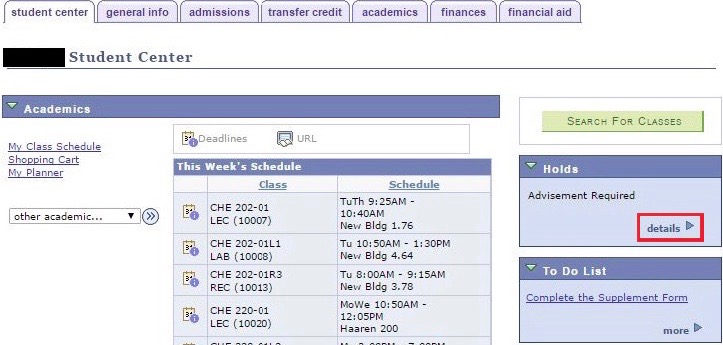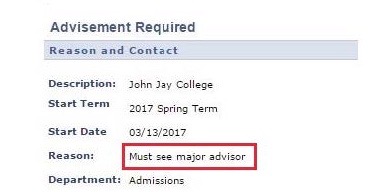Fire Science Major Resources
Here you will find:
- Key information about your major
- How and when to meet with your major advisor
- Planning tools that will help you track your progress in the major
- Ways to explore career opportunities related to the Fire Science major
Take a few moments to look at the information below. It will help you plan effectively and avoid surprises during your studies at John Jay. Please visit the Department of Security, Fire & Emergency Management website for information, resources, and opportunities!
Fire Science Requirements
You are responsible for the major requirements that were in effect when you declared the major. To confirm the requirements you should be following, go to the Undergraduate Bulletin for that academic year. For example, if you declared the Fire Science major in Fall 2015 or Spring 2016, you would click on the 2015-2016 Undergraduate Bulletin. If you declared the major and then left the College for more than one full semester, you’re responsible for the major requirements in effect when you return, if they have changed. Not sure when you declared the major? Find out here.
Below, find the Undergraduate Bulletin that was in effect when you declared the major.
- 2024-2025 Undergraduate Bulletin - FIS
- 2023-2024 Undergraduate Bulletin - FIS
- 2022-2023 Undergraduate Bulletin - FIS
- 2021-2022 Undergraduate Bulletin - FIS
- 2020-2021 Undergraduate Bulletin - FIS
- 2019-2020 Undergraduate Bulletin - FIS
- 2018-2019 Undergraduate Bulletin - FIS
- 2017-2018 Undergraduate Bulletin - FIS
- 2016-2017 Undergraduate Bulletin - FIS
- 2015-2016 Undergraduate Bulletin - FIS
- 2014-2015 Undergraduate Bulletin - FIS
- 2013-2014 Undergraduate Bulletin - FIS (PDF)
- 2012-2013 Undergraduate Bulletin - FIS (PDF)
Major Advising
Fire Science students who have questions during the Fall 2024 semester should email the major coordinator, Professor Robert Till (rtill@jjay.cuny.edu).
Fire Science students who have questions during Summer session (June 3- August 27) 2024 should email the major coordinator, Professor Robert Till (rtill@jjay.cuny.edu).
Sophomores with 45-59 credits may have a hold on their registration. The hold will be removed when they have a major advising appointment with Professor Robert Till (rtill@jjay.cuny.edu). This discussion will encourage wise planning and allow students to ask any questions they may have about the major. How do you know if you have a major hold? Go to CUNYfirst and complete the following steps:
- Check the Holds box of your CUNYfirst Student Center. If "Advisement Required" appears, click on “details.”

- Click on “Advisement Required.”

- See which type of advisement you need. If you must see a major advisor, then make a major advising appointment following the steps preferred by this department.

Plan Ahead: Graduate on Time
The FIS major has several courses that build on each other in a sequence, so it is important to be aware of this and plan accordingly. Keep the following guidelines in mind:
- FIS 101 is a foundation course for most of the FIS major courses, so take it early.
- Look ahead at the prerequisites for major courses and notice any required sequences. For example, in the Core Requirements:
- You can choose either PHY 101 or PHY 203 to meet the major’s physics requirement. However, keep in mind that PHY 203 has a MAT 241 or MAT 151 (Calculus I) prerequisite and a MAT 242 or MAT 152 (Calculus II) corequisite.
- FIS 401 requires senior standing (at least 90 credits earned).
- Remember that you will need at least a 2.0 GPA in the major and at least a 2.0 overall GPA to graduate.
- DegreeWorks degree audit - Use this online planning tool to track your overall progress toward graduation. You will see which of your general education and major requirements are completed, in progress, or still needed. Refer to the DegreeWorks FAQs to better understand how to use this helpful tool.
- Fire Science Degree Completion Checklist - Fill out this printable worksheet to keep track of which major requirements you have completed and which ones you still need.
- Sample Four Year Plan - See an example of how you could complete all your degree requirements (major, general education, electives) and graduate in four years! Remember that this sample plan shows just one possible way to combine your requirements. Transfer students in particular should work with advisors to determine a plan that works best for them.
A General Academic Advisor will confirm what general academic requirements you still need, make suggestions about smart course planning that will help you graduate without delays, discuss your interest in adding a minor or second major, inform you about opportunities such as study abroad, discuss general questions and concerns, and make helpful referrals. Visit the Academic Advisement Center's webpage for more information.
FIS and Careers
If you are interested in Fire Science graduate studies, please consult with your FIS major advisor and other FIS faculty for perspective and guidance.
This major is a great foundation for jobs in:
- Firefighting
- Consulting
- Fire Protection Systems Designer
- Fire inspector
- Insurance
- Engineering Technology
Listen to Professor Robert Till share interesting details about the FIS major and how it can help prepare you for a surprising range of jobs that need well-trained professionals!
The Center for Career and Professional Development is a great resource for all questions related to job searches, internships, and career preparation. CCPD staff are available to meet individually with students and alumni in L72.00 New Building. To request a 45-minute counseling appointment, log on to John Jay Careers Online. 15-minute drop-in sessions are available all day Mon-Fri. (Stop by in person earlier the same day to schedule a drop-in session.)